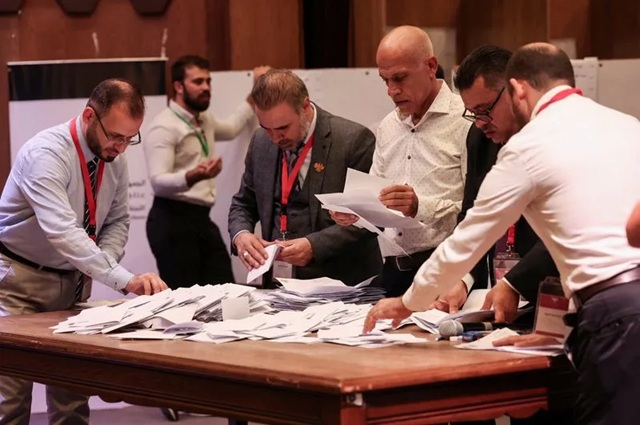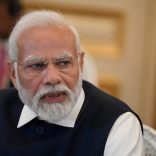Modi defiant as Trump steps up pressure on India’s Russian oil purchases
First results for Syria’s new parliament show low share for minorities, women

FILE - Members of electoral colleges count votes, on the day they vote for candidates of the new Syrian Parliament since Bashar al-Assad's government was toppled, in Aleppo, Syria, October 5, 2025. [File photo: Reuters/Mahmoud Hassano]
Syria on Monday published preliminary results of an indirect vote for a new parliament, a key step in the shift away from ousted leader Bashar al-Assad but one that has sparked concerns about inclusivity and fairness under the country’s new leaders.
Sunday’s vote saw around 6,000 members of regional electoral colleges choose candidates from pre-approved lists, part of a process to produce nearly two-thirds of the new 210-seat body. President Ahmed al-Sharaa will later select the remaining third.
In the days preceding the vote, analysts and some Syrians had voiced concerns that it was too centrally managed and that suspending elections in areas outside government control meant not all communities were being fairly represented.
In preliminary results issued on Monday, Syria’s electoral committee said that 119 lawmakers had been selected but did not include the number of votes each received. It said unsuccessful candidates had until 5 p.m. local time (1400 GMT) to appeal.
Concerns over representation, short appeals window
Six new lawmakers are women, according to a Reuters count verified by election observers. The observers said four of those elected were from religious minorities, including a Christian, an Ismaili Muslim and two Alawites, the sect from which Assad hails.
Another six are from ethnic minorities: three Turkmen and three Kurds, one of whom is a woman, the observers said.
One of the election observers described the new parliament as overwhelmingly Sunni Muslim and male. The observer also said the short appeal window severely restricted the ability to file objections and undermined the integrity of the process.
The authorities say they resorted to an indirect system rather than universal suffrage due to a lack of reliable population data following the war, which killed hundreds of thousands of Syrians and displaced millions.
Citing security and political reasons, authorities postponed the vote in areas outside government control, including Kurdish-held parts of Syria’s north and northeast, as well as the province of Sweida, held by the Druze minority.
Those suspensions left 21 seats empty. It remains unclear when votes could be held there.
Analysts say the 70 lawmakers appointed by Sharaa will be decisive in determining the level of diversity and inclusivity of Syria’s first post-Assad parliament.
Parliament was slightly larger under Assad, with 250 seats of which two-thirds were reserved for members of his Baath party. The last elections in July 2024 were labeled a farce by Assad’s opponents.
Female representation in parliament was also low under Assad and his father Hafez before him. Women lawmakers made up only 6% to 13% of the legislature from 1981 until Bashar al-Assad was toppled, according to the Inter-Parliamentary Union, which collects data on national parliaments worldwide.












Leave a Reply
Be the First to Comment!
You must be logged in to post a comment.
You must be logged in to post a comment.